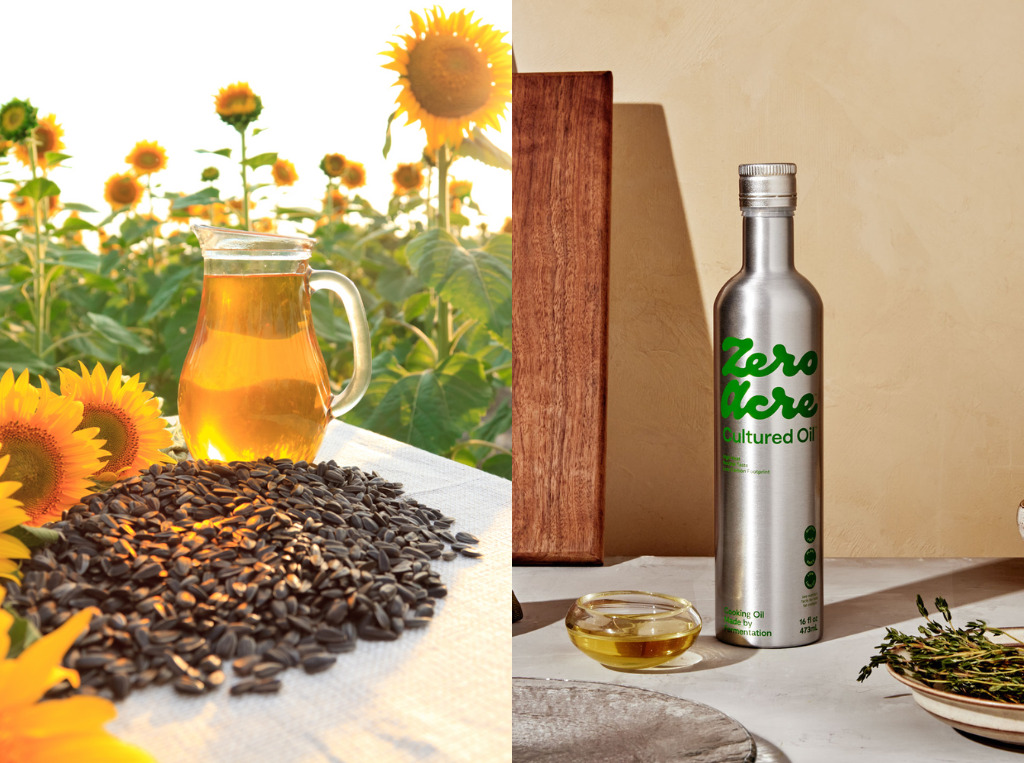The Seed Oil Conundrum: Why are Fast-Food Restaurants Ditching These Fats?
8 Mins Read
A handful of restaurants and fast-casual chains are bidding adieu to seed oils as consumer concerns about the health credentials of these fats grow. Some are turning to alternatives like Zero Acre’s sugarcane-based cultured oil – what’s all the fuss about?
In September, fast-food chain Shake Shack began trialling an eco-friendly Cultured Oil by Californian startup Zero Acre Farms at two of its locations in New York City. This meant it was ditching the soybean oil it usually uses, and replacing it with Zero Acre’s better-for-you fermented cooking oil.
Last month, burger chain Hopdoddy announced it would go seed-oil-free in its eateries, starting with 10 locations. It too swapped soybean oil for Zero Acre’s offering. Millennial-popular fast-casual salad chain Sweetgreen issued a press release saying it would only use extra virgin olive oil instead of sunflower oil to cook vegetables, grains and proteins going forward.
Zero Acre, which raised $37M in a Series A funding round last year with participants including British band Coldplay and Robert Downey Jr’s FootPrint Coalition – itself received an undisclosed sum from fast-food giant Chipotle’s VC fund, Cultivate Next. The fund is meant for climate-friendly solutions but the announcement also signalled a potential future partnership for the two brands.
Why are fast-food chains getting rid of seed oils? And what does Zero Acre offer instead?
Why people say seed oils are bad for you
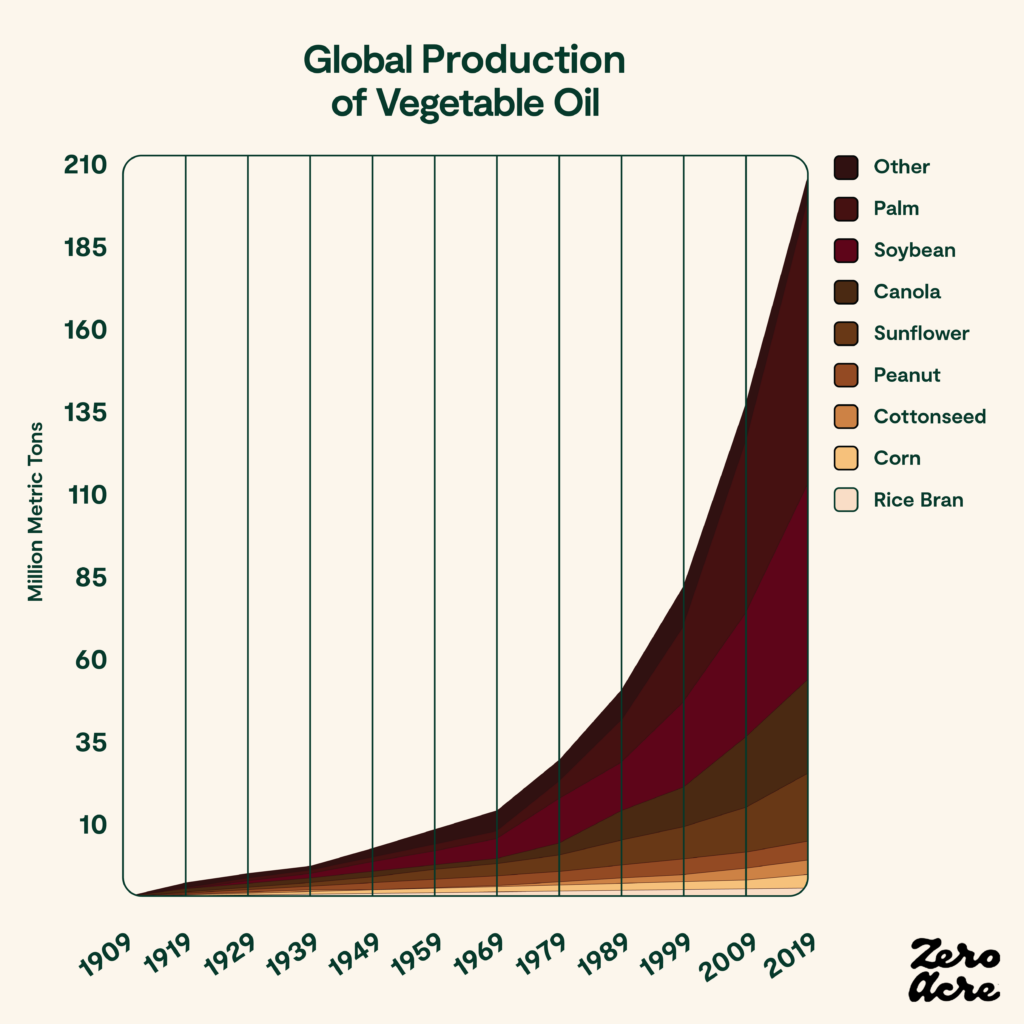
Seed oils – which include the likes of soybean, corn, canola (aka rapeseed), cottonseed, grapeseed, sunflower, safflower, peanut, sesame and rice bran oils – have seen a massive increase in consumption. In the US, the consumption of soybean oil alone grew 1,000-fold from 1909 to 1999. Globally, vegetable oil production has grown 16-fold since 1909 and doubled in the last 20 years.
But these fats have cultivated a bad rep among consumers, and the topic has become popular of late in part due to a growing number of Bitcoin and Tiktok influencers citing research finding them inflammatory or toxic. The argument centers around what makes up the fat content in these oils, and how they’re used.
Saturated, trans, monounsaturated and polyunsaturated fats are four of the most common types of fat found in food products. The first two are known to be bad for you and are tied to heart disease and cancer. The latter two, however, are said to be healthier fats, containing some essential fatty acids. Two of these acids are omega-3 (usually found in fish) and omega-6 (commonly found in seeds and nuts).
But whole omega-3 fatty acids are usually hailed for being heart-healthy, omega-6 acids don’t always enjoy the same reputation. This is due to the presence of linoleic acid, which critics say can oxidise 40 times faster than saturated fat, creating free radicals that can cause a host of diseases.
Linoleic acid has been linked to increased inflammation, which can be a bedrock of different illnesses and conditions. The body can convert this into arachidonic acid – another fatty acid – which, when oxidised, can form molecules that can cause inflammation, blood clotting, and blood vessel compression.
Another part of this argument against seed oils is what happens when they’re heated up. When heated to high temperatures beyond their smoke point, seed oils high in linoleic acid can generate a compound called hydroxynonenal, which can lead to health issues like decreased metabolism and higher oxidative stress.
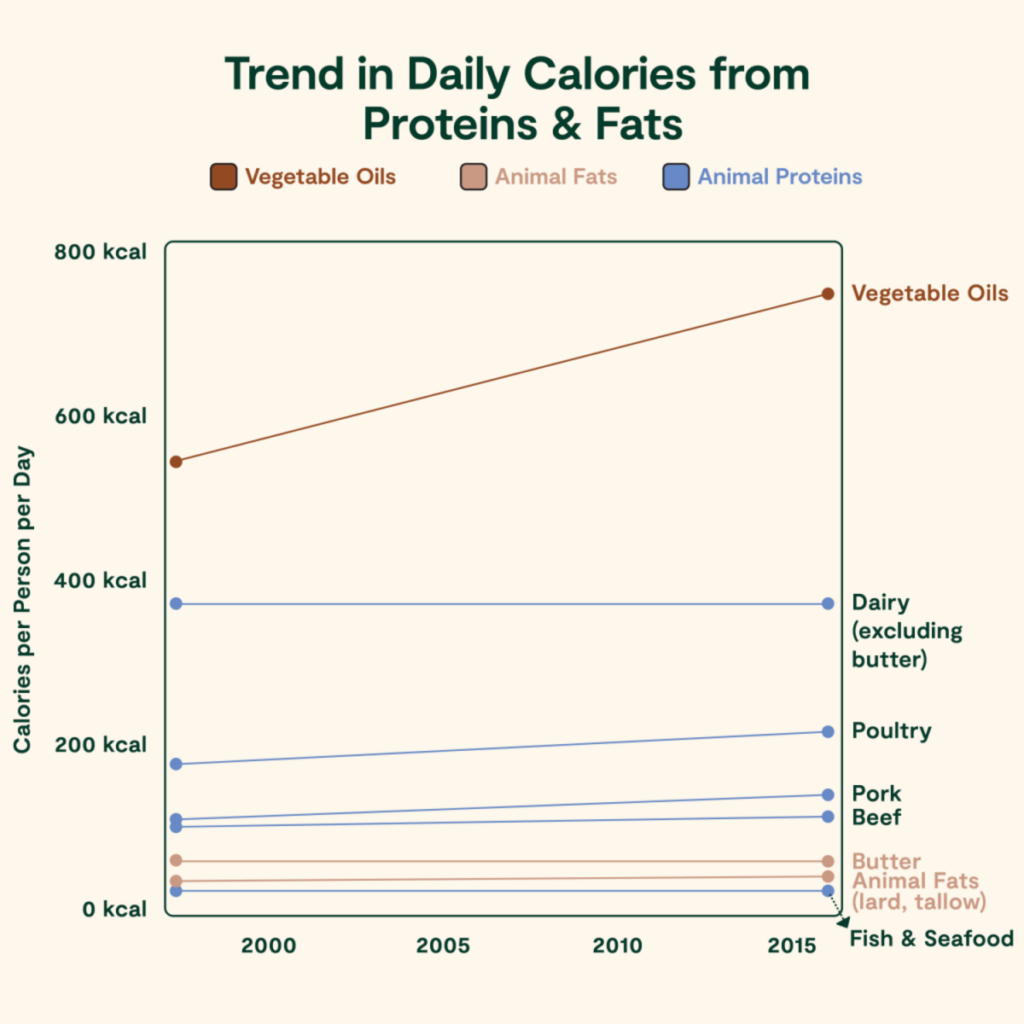
While most people in the know agree that a small amount of linoleic acid and omega-6 is essential for good health, it’s the high consumption of these oils that is being knocked by its critics. The average human eats around 6-10% of their overall calories from linoleic acid today. However, the American Heart Association and Institute of Medicine actually recommend getting 5-10% of your daily calories from omega-6 fats.
How valid are these claims, and how does Zero Acre compare?
The issue with health research is that there’s so much of it and it’s hard not to get bogged down by conflicting conclusions. In a review of evidence about seed oil’s impact on heart disease, Zero Acre concluded: “Given that increasing dietary linoleic acid above evolutionarily appropriate levels consistently increases heart disease mortality and all-cause mortality, one of the safest approaches to preventing heart disease may be to avoid seed oils.”
But there is opposing science here too. For example, in 2019, a 30-study analysis by scientists showed that linoleic and arachidonic acid levels didn’t raise the risk for heart disease and that people with higher amounts of the former in their bloodstream were 7% less likely to develop it. This type of conclusion is typical of most arguments about seed oil- for every claim, there’s a counterclaim, resulting in a great deal of confusion on the subject. Some studies say high consumption of seed oils can cause obesity, forms of cancer, and type 2 diabetes too, while others refute these claims.
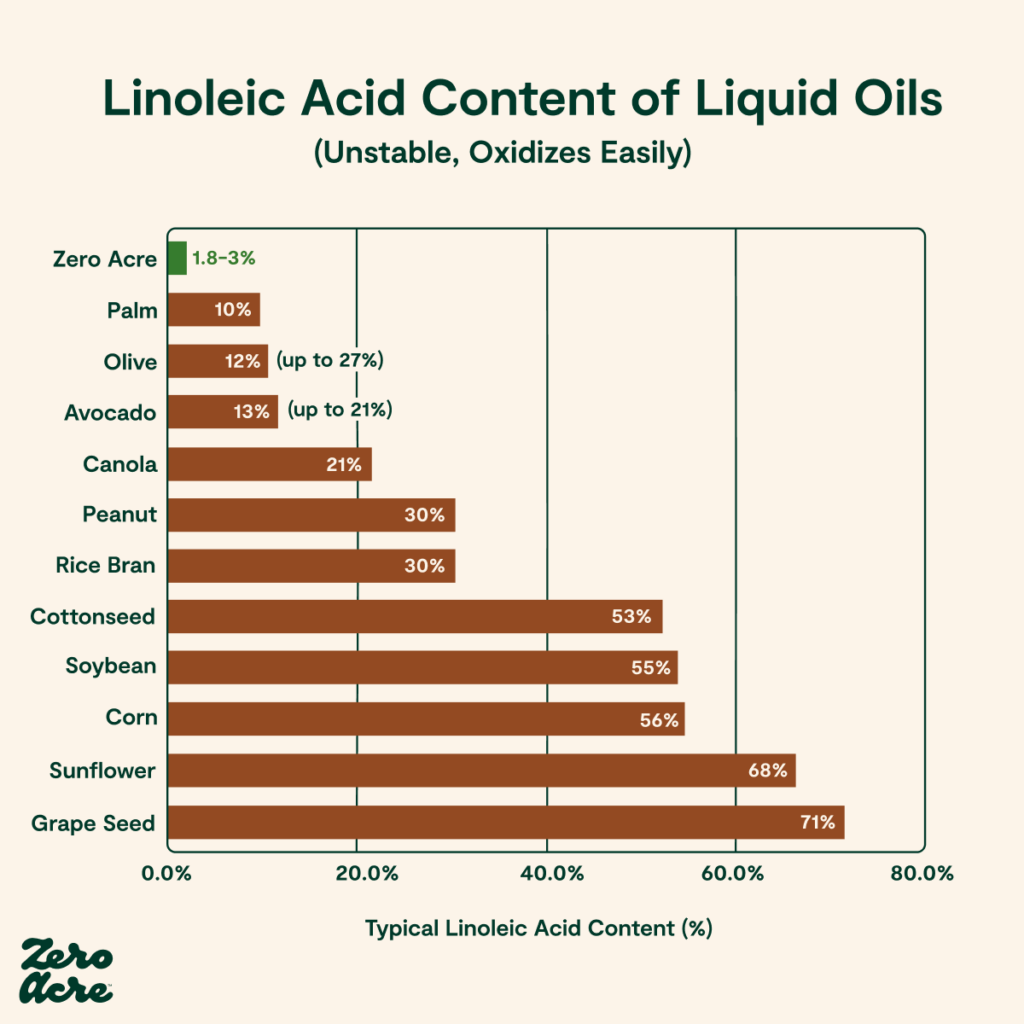
A large part of this discourse comes from seed oil’s use in ultra-processed foods as well, which make up 60% of an average American’s daily calories – and it’s the high concentration of sodium, sugar, refined carbohydrates and calories that could be more detrimental to your health, as Guy Crosby, an associate nutrition professor at the Harvard TH Chan School of Public Health, told Consumer Reports: “If you cut back on these foods, chances are you’re going to feel better.”
So how does Zero Acre fare? According to the company, its sugarcane-based cultured oil made via fermentation has the lowest linoleic acid content of all oils and does not turn toxic when heated at high cooking temperatures, the two key health criticisms attributed to most seed oils.
The company says that, on average, its oil contains 0.3-1% of omega-3, 1-3% of omega-6, and over 90% of omega-9 (a monounsaturated fat). And in terms of the types of fats, it has about 4% of saturated fat, 90-94% of monounsaturated fat, and 3% of polyunsaturated fat.
Compared to the linoleic acid content of rapeseed (or canola) oil (23%) – the most commonly sold cooking oil – and olive oil (12-27%), Zero Acre contains between 1.8-3%. This compared to canola , which contains 63% monounsaturated fat, while olive oil has 55-83%.
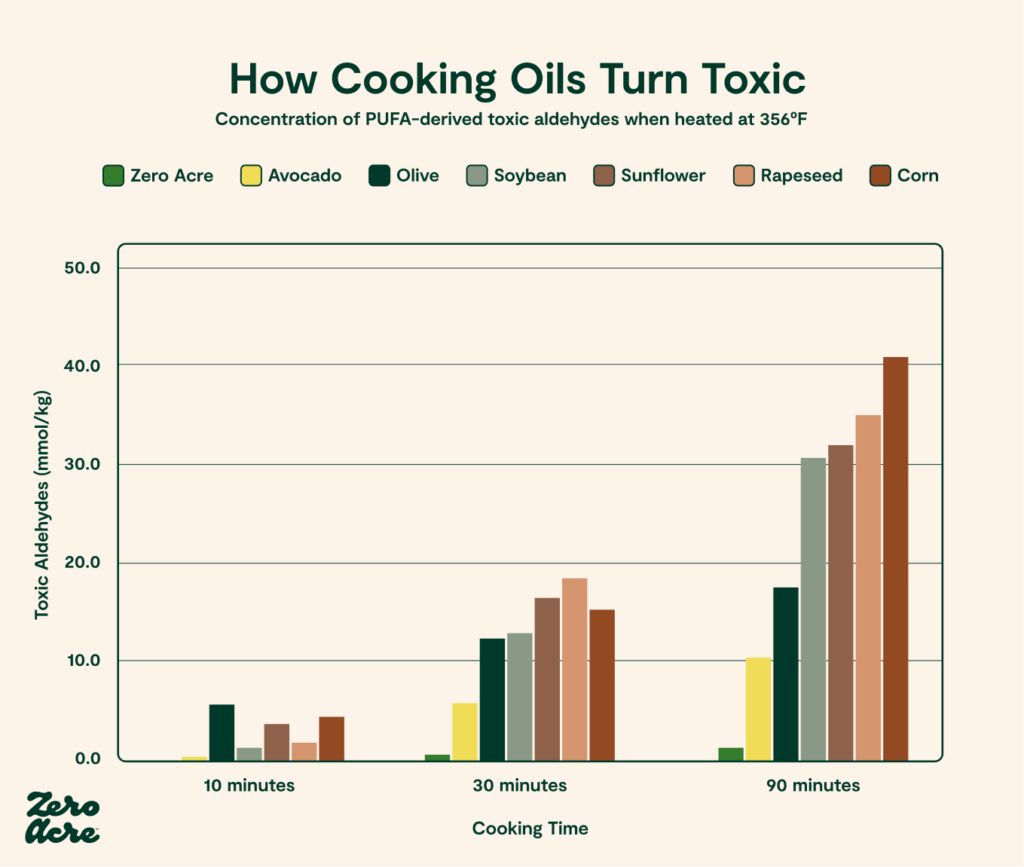
Zero Acre, which incorporated as a public benefit corporation, says its product is the only cooking oil it studied that didn’t “turn toxic” after 10 minutes of cooking, while only ghee, butter and tallow are less susceptible to oxidation than its cultured oil. This means it has a higher oxidative stability than all plant-based oils it studied.
On the pros side, the company adds that its oil offers high levels (over 90%) of heart-healthy and heat-stable monounsaturated fat and an unprecedented level of traceability and transparency.
The environmental question
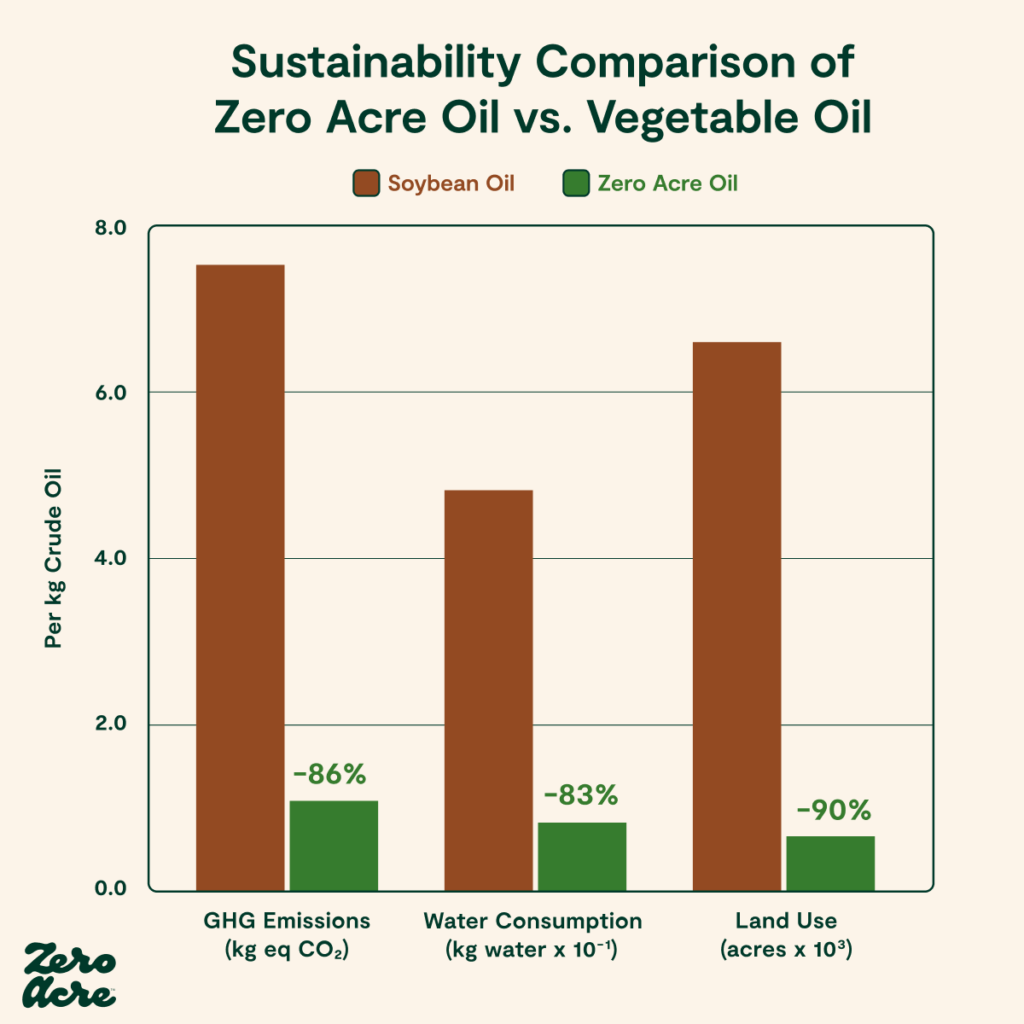
Another criticism of seed and vegetable oils – and one with firmer scientific evidence – is their environmental impact. Zero Acre co-founder Jeff Nobbs told Green Queen that while olive oil might be “the closest ‘peer’ in the grocery store” in terms of fatty acids – though it contains more saturated fat and omega-6 fat, and less omega-9 – it “tends to have a lower smoke point and less neutral flavour, along with a much larger environmental footprint”.
Vegetable and seed oils have a massive climate problem, spearheaded by palm oil and the fat derived from its seed, palm kernel oil. Palm oil, which is present in half of all supermarket products across all categories, is a major driver of deforestation. It accounts for 40% of all oil production, and growing demand has led to increased tropical deforestation – which is responsible for nearly 20% of all greenhouse gas emissions annually.
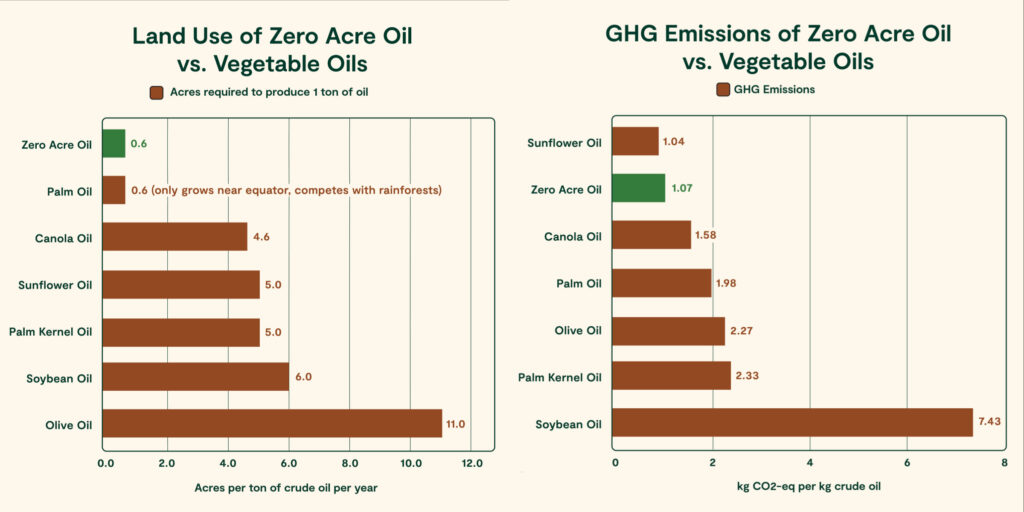
Olive oil, meanwhile, has a high water and land use footprint, and its production generates a huge amount of waste. Zero Acre commissioned an independent life-cycle analysis to assess its environmental impact and has found that it uses 18 times less land than olive oil to produce a ton of product.
Meanwhile, if just 5% of vegetable oil in the US were replaced with the company’s alternative, it would save 3.1 million acres of land, 56.9 billion gallons of water and 3.6 tonnes of CO2e. Only sunflower oil has lower emissions than Zero Acre’s offering, while only canola oil needs less water.
There’s the packaging too: Zero Acre says its oil comes in a 100% recyclable BPA-free aluminium bottle, “offering a more sustainable option than plastic or glass”.
Food pundits agree that the environmental cred of Zero Acre is a winning factor, separately from the health controversy. As Matt Newberg, founder of food tech media outlet HNGRY, writes: “While there is little evidence supporting that seed oils are actually more harmful for our health than their alternatives, products like Zero Acre Farms do pose major sustainability advantages.” Newberg does point out that solutions like Zero Acre are not ready for scale today: “until it is ready for large-scale foodservice beyond a dozen locations in the US at the right price, Cultured Oil won’t be able to make a real dent” but given that the company is less than three years old and already at pilot stage with multiple food companies, there’s every reason to be optimistic.
Widespread adoption would also drive down the steep cost of Zero Acre’s oil, which retails at $29.99 for a 16oz/473ml bottle. Can it – excuse me – pip its competitors?

